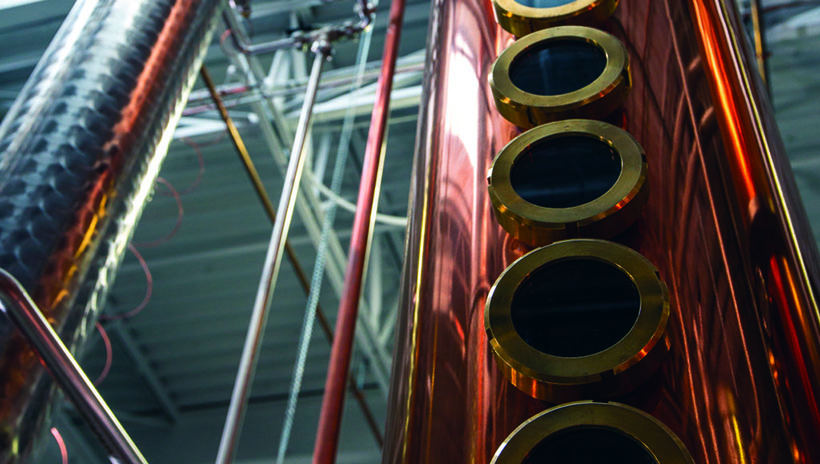Publisher's note: This post appears here courtesy of the Carolina Journal, and written by John Trump.
A continuous column still at Top of the Hill Distillery in Chapel Hill. | Photo: Top of the Hill Distillery
Thousands of distillers, brewers, and vintners across the country, are worried.
Probably rightfully so.
It's not onerous state rules or continued noise from prohibitionists that worries them. Those are certainly deep concerns, but not necessarily in this moment.
The target of their collective consternation is Washington, D.C. And their worries aren't about what federal lawmakers will do. It's more about what they may
not do.
The
Craft Beverage Modernization and Tax Reform Act, S. 362, originally part of the omnibus tax bill the president signed into law in 2017, lowered the federal excise tax on distillers to $2.70 per proof gallon of spirits on the first 100,000 gallons produced or imported annually.
The act, among other provisions, also greatly eases tax burdens on breweries and wineries.
For example, writes
Brewbound, brewers who produce fewer than 2 million barrels annually pay $3.50 per barrel for their first 60,000 barrels and $7 per barrel after that. Without an extension, those brewers would pay $7 per barrel. The cuts, says
Wine Spectator, had two major parts - decreases on the amount taxed per gallon and an adjustment on the amount taxed on wines of differing alcohol levels.
Problem is, the tax reduction expires at year's end, and, says the
Distilled Spirits Council of the U.S., craft distillers will face a 400% increase in their federal excise taxes on that first 100,000 proof gallons - an effective increase from $2.70 per proof gallon to $13.50 per proof gallon. DISCUS is an industry trade group in Washington.
That would badly hurt distillers, who, says DISCUS, have hired staff, bought new equipment, offered employees' benefits, and expanded partnerships with suppliers, such as farmers.
Current legislation, though, would make reforms permanent, and support for the bill, says DISCUS, has reached an all-time high, with 73 co-sponsors in the Senate, including Sen. Thom Tillis, R-North Carolina.
In July, more than 150 craft distillers, including two from North Carolina, went to Washington to meet with lawmakers about the act, and the ramifications should Congress allow the historic tax cuts to expire.
"We've hired four full-time employees and one part-time," says Scott Smith, an owner of Outer Banks Distilling in Manteo. Smith visited the U.S. Capitol, along with Zeb Williams of Old Nick Williams Co. Farm & Distillery in Lewisville, in July.
"To us, it's been huge," Smith says.
"It's allowed us to grow the business. We have more feet on the ground, more people doing the work that just four of us were doing. It's allowed us to make more rum.
"If it goes back up 400%, that's going to send a lot of guys scrambling, trying to figure out how to make ends meet and what to with staff.
"We're gonna have to ... re-evaluate how we're doing business and really cut back on a lot of things, and we don't want to cut back on staff. Basically, as soon as [the tax cut] happened, it allowed us to really start putting money back into the business and really start to get people hired."
Chris Swonger is DISCUS president and CEO.
"For the last two years, the Craft Beverage Modernization and Tax Reform Act has enabled distilleries across the United States to expand their businesses, create jobs and reinvest in their communities," Swonger says in a statement.
"Without this critical piece of legislation, that growth could come to a halt. There is no doubt this bill has broad support. It is time for Congress to act and provide the stability distillers need to continue to generate new jobs and support local agriculture and tourism."
Swonger, says Williams, spoke recently to members of the Distillers Association of North Carolina. Williams says Swonger is optimistic about at least a temporary extension.
But hyper-partisan politics and the impeachment hearings are affecting the process. Williams hired his only employee because of the tax cuts, and he also has spent money on research and development and innovation. Williams wants to place the distillery's products in five states over the next three to six months, but failure to extend the tax cuts could hinder those plans.
"We calculated how much money we were going to save ... and it actually made it affordable for me to have an employee, so we hired him because of that," Williams told
CJ.
"In the meantime, we've developed several products that are higher proof. I do a generic and over proof rum right now, that's a 126 proof. The tax on that bottle [could] go up 450% and make it impossible for me to sell a white rum, even at a 126 proof, because when you stick on a $5 federal tax, and North Carolina takes their 48%, at the end of the day the consumers aren't going to pay what it's going to cost for me to get my money out of it."
Should lawmakers fail to extend the cuts, Williams, understanding the reductions weren't permanent, has planned for the worst.
"Do I think it would close my doors? No, but it would make it a challenge moving forward."

